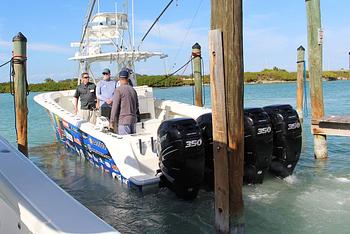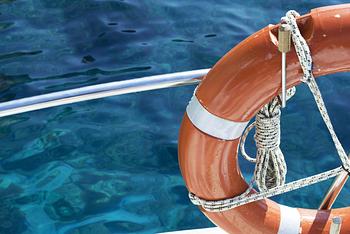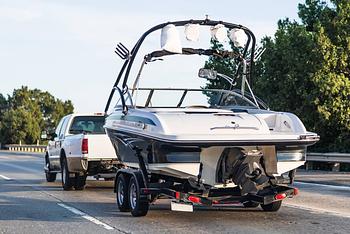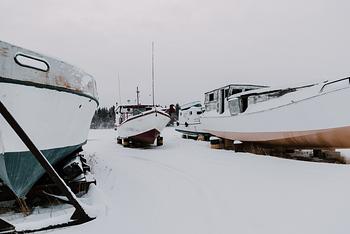Boat ownership is all about the days (or weekends) you spend out on the water, away from the stresses of everyday life and immersed in the relaxation that bobbing on the sea or lake can offer. Whether it’s a day of fishing with a buddy, swimming and watersports with the whole family, lunch on board with friends or a weekend of adventuring, then you’ll need a boat plan of action to truly make it a success. Preparation is vital to both the safety and enjoyment of your outing so here we take a look at the planning you should be doing before embarking on an unforgettable trip on your boat.
Safety First
Safety is the key to a successful day or weekend on your boat and all planning should focus on safety first. The size of your boat, the length of time you’re cruising for, the conditions you will be cruising in and the number of people on board all affect what safety steps you need to take, but as a minimum you will legally need:
-
Life jackets for everyone on board
-
Fire extinguishers (see our guide to fire safety on boats)
-
A first aid kit
-
Flares and visual distress signals
-
A sound signal
In addition there are many items which will make your trip safer and ensure you are covered if things go wrong. Your boat should also be equipped with:
-
An anchor, chain and, especially if you are boating for multiple days, a spare anchor
-
The boat’s documentation as well as any relevant documents you might need for entering marine parks, fishing etc
-
Navigational instruments including a compass, VHF radio, GPS/Chart plotter, fish/depth finder and charts
-
Radio
-
Lights for night navigation
-
Toolkit
-
Binoculars
-
Watersports flags
-
Extra lines and fenders
-
Boat hook or pole
It is always a good idea to double check your dinghy too, as it’s your only way on and off a moored buoy or if anything goes wrong and you need to abandon ship. Check that the hull is in good condition, any inflatables are sound and that the engine is working or paddles are present. Likewise, check your tanks before you set off, making sure the fuel and water tanks are full and the waste is pumped out.
Decide on Your Destinations and Stops
Once you know the boat is ship shape and all safety equipment is on board it’s time to decide on your route. If you’re going for a day trip on a boat then you might not be planning to travel too far, but if you’re going for a weekend you’ll have to plan for which stops you’ll be making and where you’ll be overnighting. You’ll need to research where you’re allowed to anchor and know about any tides or currents, or call ahead to marinas to ensure they have space for you (mooring buoys are usually first come first served). While a lot of the fun of boating is seeing what the day brings you, working out where you’re going and what you’re doing will ensure you don’t end up disappointed or searching for somewhere to anchor in the dark. It’s also a good idea to have a back-up plan for where you will sleep in case things don’t go as you’d hoped. You can buy cruising guides for different areas which will help you make your decisions, but you can also ask local boat owners in your area for advice too.
Your weekend boat plan should also include fuel stops and you’ll need to make a calculation of how much distance your boat can do on a tank of fuel and then use a conservative 70% of this to plan for fuel stops. It’s always best to err on the side of caution and fill up much sooner rather than later as poor weather, winds or a last minute detour to a must-see destination can send your initial calculations off.
Check the Weather
As your departure day gets closer it’s time to start closely checking the weather. When plans have been made and excitement levels are high it’s easy to want to push through poor weather to still make the trip happen. Be honest with yourself and objective – if it looks like a storm might brew, winds are high or there is weather in the distance which might turn then the safest thing to do is to postpone the trip. Not only will it be unsafe but you won’t enjoy it anyway.
Create a Float Plan (for longer trips)
A float plan is a good idea whenever you leave the dock, but particularly important if you’re going away for more than a day. It’s essentially a document which details where you plan to go, who is on board and when you plan to return. It can be as simple as letting someone trustworthy know when to expect you back and your planned route, but for a longer journey you can file an official document from the US Coast Guard. If you get lost or aren’t back when you should have been, the relevant marine rescue authorities will have access to your route.
Pack for the Unexpected
When packing your boat for your trip you want to find the balance between over packing and not taking items you might need with you. The key is to pack for all weathers and eventualities, not just what the forecast says or the length of time you plan to be away. Take food to last everyone at least two more days, plenty of fresh drinking water and clothes for both extreme heat and cold and rain – even if either of those seem unlikely. If you’d planned to fish for your dinner take along a back-up meal just in case!
Brief Everyone on Board
On the day of your trip you want to have a short briefing with everyone who will be with you onboard. You can tell them about the proposed trip, how long you’ll be at sea for, when the stops will be and, most importantly, any safety instructions. Children in particular, or those who haven’t been on your boat before, need to have clear instructions about the do’s and don’ts. Nominate a second in charge and make sure they know how to use the radio and where the fire extinguishers are. Clear instructions are key to everyone having fun and being safe onboard.
Have Fun
While it might seem like a lot of preparation, getting ready for a trip at sea is all part of the fun. When you see it as one big adventure the preparatory work becomes something you look forward to and something which you complete as standard before each outing. Once your checklist is finalised and you’re happy everything is safe, it’s time to head off to make amazing memories and enjoy every moment of your boating lifestyle.
If you’re considering joining the hundreds of thousands of boat owners all around the world then Rightboat.com should be your first port of call. With the biggest selection of new and used boats for sale as well as lots of guides and advice for new and experienced boat owners you can embark on a new and exciting journey as a boat owner.
Related Articles and Guides
18th Jun 2024
How to Dock a Boat with Joysticks, Single Engines, and Twins: Tips and Technique...
20th May 2024
Essential Boat Safety Tips for Every Type of Watercraft
29th Mar 2024
How to Transport Your Boat Four Different Ways
18th Oct 2023






